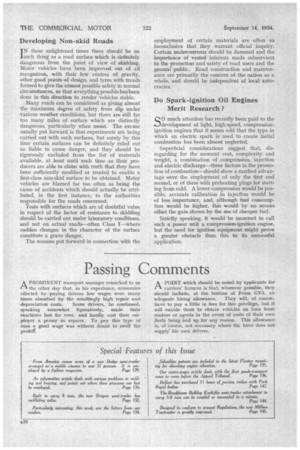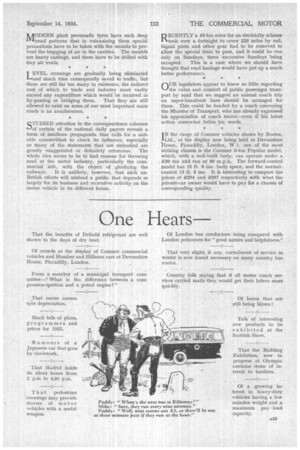Passing Comments
Page 28

Page 29

If you've noticed an error in this article please click here to report it so we can fix it.
APROMINENT transport manager remarked to us the other day that, in his experience, economies effected by paying drivers low wages were many. times absorbed by the resultingly high repair and
depreciation costs. Some drivers. he continued, speaking somewhat figuratively, made their machines last for ever, and hardly cost their employer a penny in repairs. To pay this type of man a good wage was without doubt to swell the prol.tk.
APon, which should be noted by applicants for carriers' licences is that, wherever possible, they should include, at the bottom of Form GV3, an adequate hiring allowance. They will, of course, have to pay a little in fees for this privilege, but it will -enable them to obtain vehicles on loan from makers or agents in the event of units of their own fleets being laid up for any reason. This allowance is, of course, not necessary where the hirer does not supplyhis own drivers. ODERN giant pneumatic tyres have such deep iv-itread patterns that in vulcanizing them special precautions have to be taken with the moulds to prevent the trapping of air in the cavities. The rnoulds are heavy castings, and thesehave to be drilled with tiny air vents.
LEVEL crossings are gradually being eliminated and much time consequently saved to traffic, but there are still far too many in existence, the indirect cost of which to trade and industry must vastly exceed any expenditure which would be incurred in by-passing or bridging them. That they are still allowed to exist on some of our most important main roads is an anachronism.
STUDLED attention to the correspondence columns N-Jof certain of the national daily papers reveals a form of insidious propaganda that calls for a suitable counterblast to check its influence, especially as many of the statements that are embodied are grossly exaggerated or definitely erroneous. The whole idea seems to be to find reasons for throwing mud at the motor industry, particularly the commercial side, with the object of glorifying the railways. It is unlikely, however, that such unBritish efforts will mislead a public that depends so largely for its business and recreative activity on the motor vehicle in its different forms. 1Q1 ECENTLY a 45-ton rotor for an electricity scheme
%took over a fortnight to cover 220 miles by rail. Signal posts and other gear had to be removed to allow the special train to pass, and it could be run. only on Sundays, three successive Sundays being occupied. This is a case where we should have thought that road haulage would have put up a much better performance.
nT_TR legislators appear to know so little regarding 'Lithe value and comfort of public passenger transport by road that we suggest an annual coach trip on super-beanfeast lines should be arranged for them. This could be headed by a coach conveying the Minister of Transport, who has already expressed his appreciatiOn of coach travel—even if his latest action somewhat belies his words. _




















































































